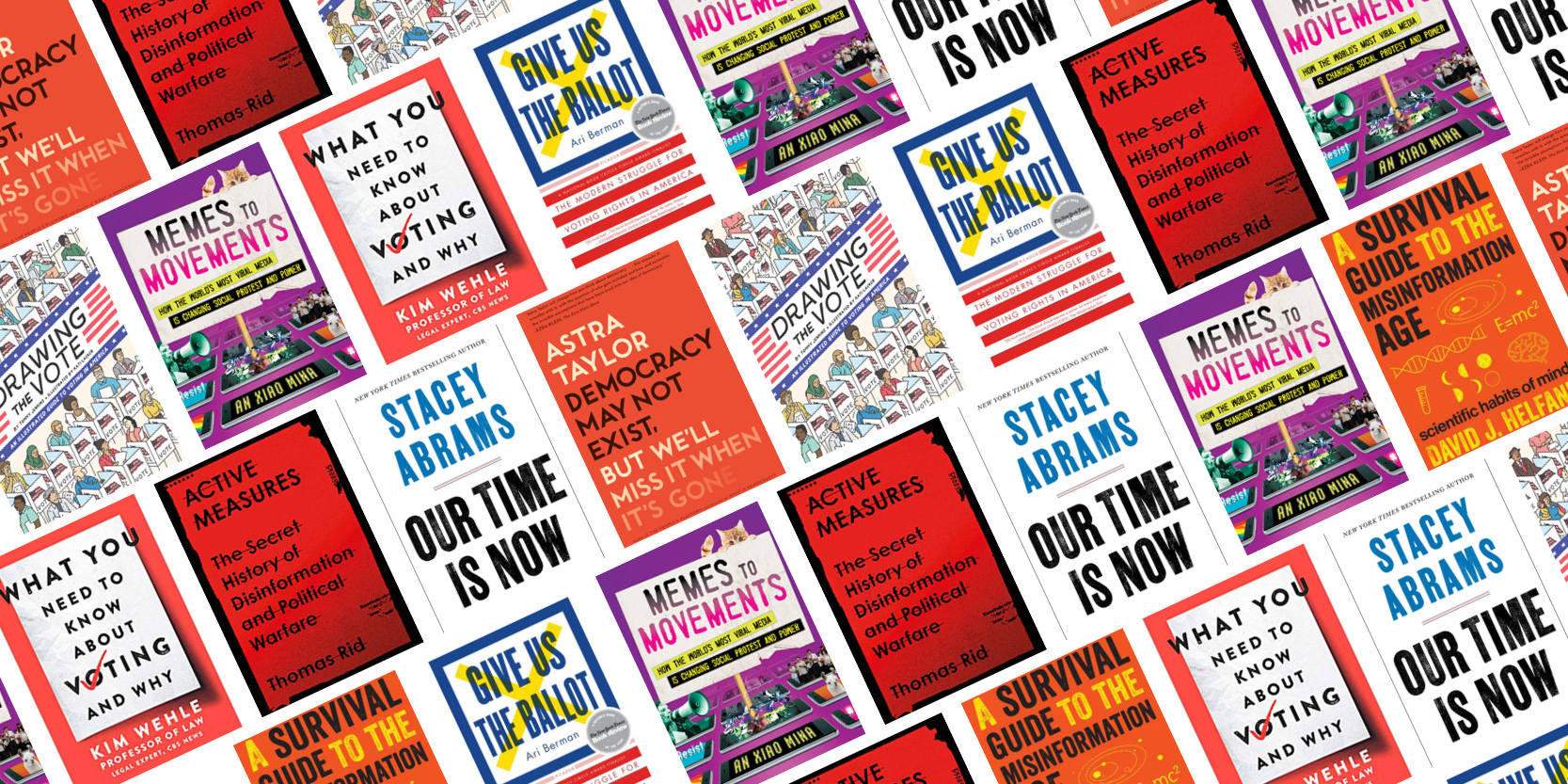
Disinformation undermines truth and poses a threat to our democracy. Hateful conspiracy theories that attempt to silence people’s voices, misleading information about voting intended to lower civic participation, and false notions about the ongoing COVID-19 pandemic have swept social media networks, and experts have warned against the dangers of foreign interference and influence in the fast-approaching election.
Amid the alarming spread of information aimed at sowing confusion and mistrust among voters, PEN America launched #WhatToExpect2020 earlier this fall in an effort to combat the insidious forces of disinformation and raise awareness about how all of us can play a role in stopping it. As part of this campaign, we have gathered a list of nonfiction books that provide historical context around this moment and can help you navigate disinformation and voter suppression, learn more about political media coverage and digital content, and be informed consumers and sharers of information, especially in this critical moment.
Summer Lopez, Senior Director of Free Expression Programs, recommends:
Give Us the Ballot: The Modern Struggle for Voting Rights in America by Ari Berman (Picador, 2016)
Bookshop | Amazon
The Voting Rights Act of 1965 was seen as a revolutionary and central part of the civil rights movement. And yet, while it’s hallmarked as a symbolic accomplishment of the civil rights movement, more than 50 years later, minorities are still facing insurmountable obstacles to exercise their right to vote. In Give Us the Ballot, Ari Berman details how American democracy changed under the Voting Rights Act—and how forces, including the Supreme Court, have sought to limit the law.
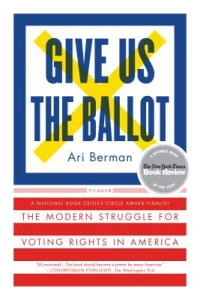
Nora Benavidez, Director of U.S. Free Expression Programs, recommends:
Our Time is Now: Power, Purpose, and the Fight for a Fair America by Stacey Abrams (Henry Holt & Co, 2020)
Bookshop | Amazon
In Our Time is Now, Stacey Abrams—whose 2018 gubernatorial campaign in Georgia brought her into the national spotlight—empowers our citizens to help end voter suppression and take back our country. Abrams reminds us that the right to vote, as well as our democracy, have been and continue to be under attack.
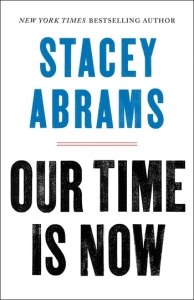
Democracy May Not Exist, But We’ll Miss It When It’s Gone by Astra Taylor (Metropolitan Books, 2020)
Bookshop | Amazon
The United States is widely understood as a democracy, at least in name. In Democracy May Not Exist, But We’ll Miss It When It’s Gone, Astra Taylor questions our nation’s history and ability to live up to that term. Real democracy, Taylor argues, is fully inclusive and egalitarian, but has never really existed. Using a philosophical, historical, and anecdotal approach, Taylor asks readers to reconsider what democracy actually means.
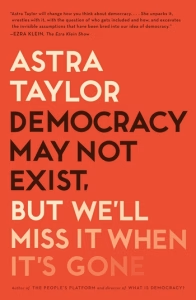
Matt Bailey, Digital Freedom Program Director, recommends:
Memes to Movements: How the World’s Most Viral Media is Changing Social Protest and Power by An Xiao Mina (Beacon Press, 2019)
Bookshop | Amazon
Social media is not only transforming the way we connect but enabling the creation of whole new forms of art and protest that are shaping movements and democracy around the world. An Xiao Mina explores the ways that the playful, the satirical, and the political come together in meme culture—and the ways that memes are powering protest and shaping the way we see reality.
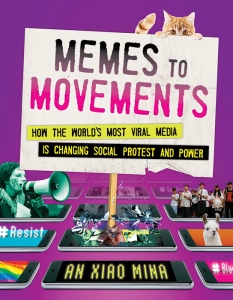
Gina Chung, Communications Manager, recommends:
Active Measures: The Secret History of Disinformation and Political Warfare by Thomas Rid (Farrar, Straus and Giroux, 2020)
Bookshop | Amazon
A compelling and comprehensive history of disinformation, Thomas Rid’s book follows how covert deception operations from the interwar period led to the internet troll farms of today. Rid, as a renowned expert on technology and national security, was among the first people to sound the alarm that Russian military intelligence was carefully planning to disrupt the democratic process of the 2016 presidential election. However, these measures are not new, as Rid demonstrates by tracking how modern misinformation began in the post-Russian Revolution period. He also sheds new light on the past U.S. election, especially the role of the notorious “troll farm” in St. Petersburg and a much more harmful attack that unfolded in the background.
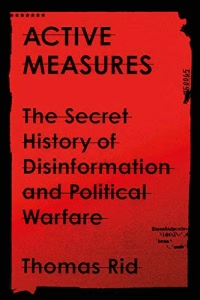
Sandy Mui, Digital Communications Assistant, recommends:
What You Need to Know About Voting—and Why by Kim Wehle (HarperCollins, 2020)
Bookshop | Amazon
Understanding the electoral system and voting process in the United States can be difficult, but it doesn’t have to be. In What You Need to Know About Voting—and Why, legal expert Kim Wehle explains what exactly a primary is, how the electoral college works, who gets to vote and why, and much more. This guide will give you the knowledge you need to make informed decisions and is pertinent to people of all ages—whether you’re a first-time voter or have voted in elections for decades.
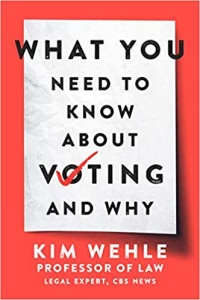
Liza Barkova and Emily Larcher, Communications Interns, recommend:
A Survival Guide to the Misinformation Age: Scientific Habits of Mind by David Helfand (Columbia University Press, 2017)
Bookshop | Amazon
David Helfand’s book provides a much-needed inoculation against the disinformation epidemic by cultivating scientific habits of mind. In our current age, information—billions of data bytes of it—is never more than two swipes away. But deciphering facts from fiction is another story entirely. The result is a massive amount of misleading information that threatens to destabilize our democracy and overwhelm our cultural and political discourse on complex social issues like public health, climate change, and food and water crises.
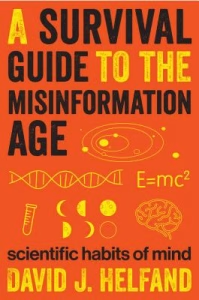
Drawing the Vote: An Illustrated Guide to Voting in America Tommy Jenkins (Author) and Kati Lacker (Illustrator) (Abrams Comicarts, 2020)
Bookshop | Amazon
An original graphic novel, Drawing the Vote discusses how the history of voting rights in the United States affects the way we vote today. Tommy Jenkins presents complex ideas and statistics in straightforward language that identify the trends and events that led to the unprecedented outcomes of the 2016 presidential election. This book offers an explanation for how every reader can take action to make sure that their ballot counts. In addition, Kati Lacker’s artistic style makes the novel accessible for people of all ages.
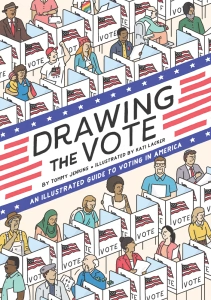
Bookshop is an online bookstore that supports local, independent bookstores and publishers.